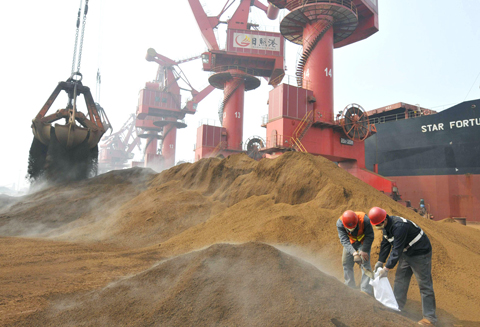Mining giant Rio Tinto announced a huge iron ore deal with China’s state-run Chinalco (中國鋁業) yesterday, days before four if its staff go on trial in a case that has threatened diplomatic and trade ties.
Rio said Chinalco signed a non-binding, US$1.35 billion deal to help develop a massive mine in Guinea, drawing a line under a period of turbulent relations with its biggest shareholder.
“We have long believed that Rio Tinto and Chinalco could work together on major projects for mutual benefit,” Rio chief executive Tom Albanese said.

PHOTO: REUTERS
The debt-strapped Anglo-Australian miner snubbed a US$19.5 billion cash injection from Chinalco last June, angering some Chinese commentators.
Weeks later, China’s spy agency swooped on Australian citizen Stern Hu (胡士泰) and three Chinese colleagues in Shanghai, prompting a rapid plunge in relations with Canberra and sending shudders through China’s foreign business community.
Hu, Wang Yong (王勇), Ge Minqiang (葛民強) and Liu Caikui (劉才魁) are scheduled for a three-day trial in Shanghai from Monday over alleged bribery and industrial espionage.
Australia yesterday insisted business with China, now its biggest trading partner, would not be harmed by the trial.
“The two matters are separate,” Trade Minister Simon Crean told public broadcaster ABC. “We are treating the Stern Hu case strictly as a consular case. We’ve never sought to make any link and neither have the Chinese in their discussions with us.”
However, Australian Prime Minister Kevin Rudd has already warned that the “world will be watching.”
Guinea’s Simandou mine, long mired by political upheaval, is described as the world’s best undeveloped source of high-grade iron ore, which is being consumed in vast quantities by industrializing China.
Analysts say the 110km seam could produce 200 million tonnes a year, matching Rio’s entire Western Australia Pilbara operation. Chinalco will acquire a 47 percent stake in the project.
“It’s a world-class monster. It’s a gorilla of a project,” James Wilson, a research analyst with stockbroker DJ Carmichael, said earlier this week.
Rio said the project, which involves building a mine, railway and port, would create tens of thousands of jobs in the country during construction and some 4,000 full-time posts when operations start.
“Chinalco brings its own skills and capabilities in major projects and access to the infrastructure expertise of other Chinese organizations,” Albanese said.

DEFENSE: The first set of three NASAMS that were previously purchased is expected to be delivered by the end of this year and deployed near the capital, sources said Taiwan plans to procure 28 more sets of M-142 High Mobility Artillery Rocket Systems (HIMARS), as well as nine additional sets of National Advanced Surface-to-Air Missile Systems (NASAMS), military sources said yesterday. Taiwan had previously purchased 29 HIMARS launchers from the US and received the first 11 last year. Once the planned purchases are completed and delivered, Taiwan would have 57 sets of HIMARS. The army has also increased the number of MGM-140 Army Tactical Missile Systems (ATACMS) purchased from 64 to 84, the sources added. Each HIMARS launch pod can carry six Guided Multiple Launch Rocket Systems, capable of

Authorities have detained three former Taiwan Semiconductor Manufacturing Co (TMSC, 台積電) employees on suspicion of compromising classified technology used in making 2-nanometer chips, the Taiwan High Prosecutors’ Office said yesterday. Prosecutors are holding a former TSMC engineer surnamed Chen (陳) and two recently sacked TSMC engineers, including one person surnamed Wu (吳) in detention with restricted communication, following an investigation launched on July 25, a statement said. The announcement came a day after Nikkei Asia reported on the technology theft in an exclusive story, saying TSMC had fired two workers for contravening data rules on advanced chipmaking technology. Two-nanometer wafers are the most

TRAJECTORY: The severe tropical storm is predicted to be closest to Taiwan on Wednesday and Thursday, and would influence the nation to varying degrees, a forecaster said The Central Weather Administration (CWA) yesterday said it would likely issue a sea warning for Tropical Storm Podul tomorrow morning and a land warning that evening at the earliest. CWA forecaster Lin Ting-yi (林定宜) said the severe tropical storm is predicted to be closest to Taiwan on Wednesday and Thursday. As of 2pm yesterday, the storm was moving west at 21kph and packing sustained winds of 108kph and gusts of up to 136.8kph, the CWA said. Lin said that the tropical storm was about 1,710km east of Oluanpi (鵝鑾鼻), Taiwan’s southernmost tip, with two possible trajectories over the next one

CHINA’s BULLYING: The former British prime minister said that he believes ‘Taiwan can and will’ protect its freedom and democracy, as its people are lovers of liberty Former British prime minister Boris Johnson yesterday said Western nations should have the courage to stand with and deepen their economic partnerships with Taiwan in the face of China’s intensified pressure. He made the remarks at the ninth Ketagalan Forum: 2025 Indo-Pacific Security Dialogue hosted by the Ministry of Foreign Affairs and the Prospect Foundation in Taipei. Johnson, who is visiting Taiwan for the first time, said he had seen Taiwan’s coastline on a screen on his indoor bicycle, but wanted to learn more about the nation, including its artificial intelligence (AI) development, the key technology of the 21st century. Calling himself an